EATIP Annual General Meeting 2025
The EATIP Annual General Meeting was held this year on the 17th & 18th of June 2025 in beautiful Norway House, in Brussels.
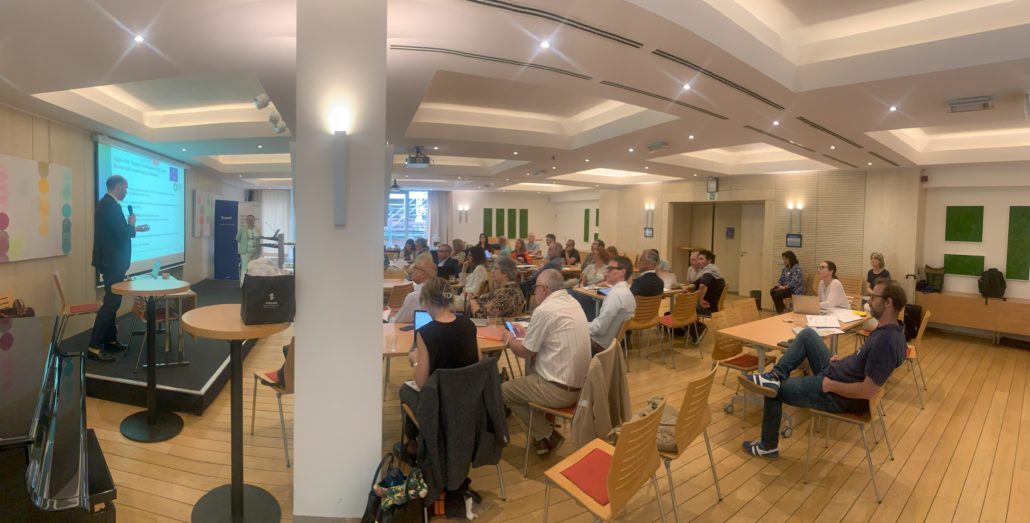
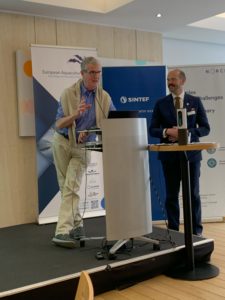
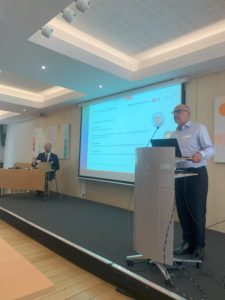
The EATIP Annual General Meeting was held this year on the 17th & 18th of June 2025 in beautiful Norway House, in Brussels.



The EATiP Platform extend to all readers our best wishes for 2022! We look forward to a successful year full of innovation and development for our sector and stakeholders.
We begin this New Year in a very positive way by welcoming two new members to our network! Indicative of our multi-stakeholder nature, one member comes from the aquaculture industry, the other from aquaculture academia.
Ace Aquatec is an award-winning aquaculture technology company specialising in in-water electric stunners; automated waterjet bleeding; gentle contactless pumping; predator deterrents, biomass cameras and Sea Lice removal systems.
Ace Aquatec – one of two new members joining EATiP in January 2022
Ace Aquatec help their customers businesses to thrive by making their operations efficient, ethical and sustainable. With the high importance attached to aquatic animal health and welfare within European aquaculture, EATiP will certainly benefit from the knowledge and experience this company can bring. With a head office in Dundee (Scotland, UK) Ace Aquatec were co-founded in 1999 by inventor John Ace Hopkins and investor Annette Pyne-Carter after they saw the potential technological innovation could have in accelerating the adoption of responsible fish farming practices. The company project manages global R&D projects, manufacturing at two UK factories, and co-ordinate installers and engineers worldwide. The company also has a Canadian office and distribution partners in key markets.
Ace Aquatec has grown from a family run business into a global supplier of aquaculture solutions retaining a key focus on local partnerships and personal customised solutions and we are delighted to welcome them to our network – sure in the knowledge we will value their experience and knowledge.
From the academic side, The University of Stavanger (Norway) represents another type of Technology Platform membership category, bringing an additional wealth of expertise to our scientific and academic membership. The Department of Aquaculture offers a number of areas of specific knowledge and expertise, where the University is keen to collaborate with EATiP members and engage in both project and other activities. Specifically, the University seeks to engage in the areas of:
The University of Stavanger – brining a wealth of expertise to the EATiP Platform.
Welcoming the new members to the EATiP platform, President Gustavo Larrazábal commented “at a challenging time for both the European aquaculture sector and European citizens in general, we are delighted to welcome these two new members to our platform, demonstrating that collaboration and engagement in the fields of research and innovation remain strong within our sector. With the increasing emphasis on fish welfare in addition to fish health, and the ambitions set out in the Strategic Guidelines for European Aquaculture and Blue Economy, along Horizon Europe and the European Missions, the wealth of knowledge and expertise brought to EATiP through the University of Stavanger and Ace Aquatec will further extend and improve our contribution to the development of a sustainable and innovative European aquaculture sector.”
EATiP is delighted to welcome as a new member to the platform API – the Associazione Piscicoltori Italiani.
API is a non-profit corporation which aims to protect, develop and consolidate all activities related to aquaculture in Italy.
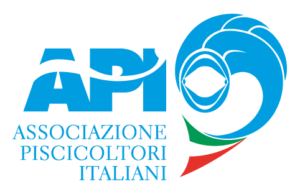
API – brining Italy aquaculture industry representation to the heart of EATiP
Established in June 1964, the professional association represents over 300 fish farms operating with fresh, marine and brackish water and of many species, representing around 90% of the Italian finfish production. Principle species farmed in Italy include Trout, Bass and Bream but there is also production of Mullet, Sturgeon (for Caviar) and Eel along with carps, catfish and other species of freshwater fish. For further details you can look at production figures here.
API’s work focuses on providing up-to-date knowledge and training opportunities to ensure the continuous professional development of fish farm workers. API has national and international recognition and exposure and collaborates with a wide range of stakeholders and a large network of fish farmers from all production methods across all of Italy.
Having collaborated informally with EATiP over a number of years through various collaborations and projects, we are delighted to welcome API to our formal list of core members. It is vital for technology platforms to be industry led and to maintain close relations with farmers and producers. The merits of the multi stakeholder approach is that it allows for a two way communication process between active stakeholders – industry informing and advising of their priorities and emerging issues and researchers disseminating and sharing project outputs, information on new technologies and farming practices and advice.
We look forward to continuing our close working relationship – which in Italy now includes not only API but also the research network ISPRA and the Italian Mirror Platform ITAQUA. A strong representation to assist in driving forward the ambitions for an expanding and sustainable aquaculture sector in Europe from one of the key aquaculture producing European Union member states.
EATiP is proud to announce that a further national Mirror Platform has joined the EATiP family – Stiim Aqua Cluster. Stiim is the sixteenth national or regional cluster to join EATiP and demonstrates the strong commitment to the Platform from the Norwegian aquaculture industry.
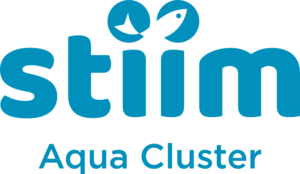
Stiim Aqua Cluster – the 16th national cluster to join EATiP
Stiim Aqua Cluster represent a complete ecosystem for aquaculture innovation in Norway. The cluster now has about 130 members and partners from all of the country and is located on the south-western coast of Norway.
This brings the total number or organisations gathered under the EATiP Mirror Platform umbrella to around 1000 members – reaching across all aspects of the aquaculture industry value chain.
Amongst the cluster’s main focus areas are:
Blue Planet Academy is the cluster’s platform for promoting best practice in aquaculture. Blue Planet Academy is the world’s largest e-learning platform on aquaculture, offering thousands of videos and a variety of online courses on fish species from salmon to tilapia to customers around the world.
EATiP are delighted to welcome Stiim as a formal member of the platform and look forward to the increased experience, knowledge and potential for aquaculture innovation that our collaboration will bring.
Further details are available from the Stiim Aqua Cluster website and also through the LinkedIn network @Stiim Aqua Cluster
EATiP is delighted to announce that EBCD – the European Bureau for Conservation Development has joined our Platform as a member organisation. EBCD is an international environmental NGO that promotes the sustainable use and conservation of marine resources.
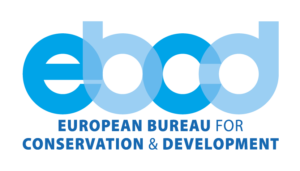 Established in Brussels in 1989, EBCD fosters dialogue and cooperation on ocean governance among all stakeholders, and works together with EU and UN institutions to advance progress on sustainable development.
Established in Brussels in 1989, EBCD fosters dialogue and cooperation on ocean governance among all stakeholders, and works together with EU and UN institutions to advance progress on sustainable development.
EBCD has a long history in engaging on sustainable fisheries & aquaculture at European and global level, tracking and informing policy developments through expert-led scientific advice and full stakeholder participation. Embracing its mission of promoting the sustainable use of natural renewable resources, EBCD was involved at the establishment of EATIP in 2007 – bringing in IUCN as an advisory body – and it has carried out several projects jointly with IUCN on aquaculture.
On becoming part of our Platform, EBCD is looking forward to contributing to the sustainable development of the aquaculture sector and in particular to supporting the achievement of SDG14 Life Below Water and SDG 2 Zero Hunger.
One of the key strengths of the European Technology Platforms is their multi-stakeholder approach, joining industry members with researchers, academics and NGO organisations. Taking a fact and science based policy approach to sustainable development is more important than ever – and such joint working demonstrates the trust and credibility that is to be found in the work of the ETPs, and the importance attached to them by the European Commission and other key stakeholders.
EBCD also provides the Secretariat to the European Parliament Intergroup on “Climate Change, Biodiversity and Sustainable Development” with a specific Working Group on Fisheries and Aquaculture as well the Secretariat to the Market Advisory Council of DG MARE and the Secretariat to the IUCN Fisheries Expert Group.
An exciting opportunity to study for a new international MSc in Aquaculture Health Management has been announced as part of the ERASMUS Mundus programme, allowing successful applicants to stay and study at 4 of Europe’s leading institutes in aquaculture: Ghent University (Belgium), Norges Teknisk-Naturvitenskapelige Universitet (NTNU, Norway), Wageningen University (The Netherlands) and the Universitat Autònoma de Barcelona &Universitat de Barcelona (Spain). Applicants will also be able to undertake a work placement and thesis research at one of the many industry and research partners with which these institutions engage.
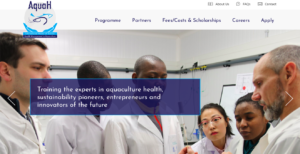
see the AquaH website for further details and information on how to apply.
Noting that the aquaculture sector is steadily reaching maturity but its further growth is increasingly facing serious problems with parasites, viral, bacterial or stress-related disease outbreaks, the AquaH programme responds to the need for an expert training that prepares students to develop and implement innovative solutions to aquaculture health issues thus contributing to the sustainable development of the aquaculture industry.
For further details on the course programme, fees, and how to apply, please see the Aquah website: https://aquah.eu
The deadline for applications is 01 March 2021.
About Skretting
Skretting is the global leader in providing innovative and sustainable nutritional solutions and services for the aquaculture industry. Skretting has production facilities in 19 countries on five continents, and manufactures and delivers high quality feeds from hatching to harvest for more than 60 species. The total annual production volume of feed is more than 2 million tonnes. The head office is located in Stavanger, Norway. Our mission is Feeding the Future.
About Skretting ARC
Skretting Aquaculture Research Centre (ARC) is the global research organization for Skretting. The research centre is based in Stavanger, Norway, and has further research units in Italy, Spain, China and Japan. Skretting ARC employs an international team of highly skilled specialists, supported by a substantial annual investment in advanced R&D. It performs research for all feed companies within Skretting, which produce more than 2 million tonnes of fish and shrimp feed on a global scale. Skretting ARC’s goal is to develop innovative solutions to support fish and shrimp farmers around the world and help Skretting maintain its leadership position at the forefront of the rapidly developing aquaculture industry.
AQUACULTURE GROUP
The aquaculture group activity is focussed mainly on aquatic ecology, fish biology, reproduction, nutrition and fish feeding, quality and authenticity of fish.
The group operates both in the Department of Veterinary Medicine (DIMEVET) and in the Department of Agricultural and Environmental Sciences (DISAA) and comprises several operative units.
The Lodi Aquaculture Research centre consists of three different recirculating aquaculture systems (RAS) for farming of aquatic animals and structures for growing phyto- and zooplankton. Oxygen concentration, pH and conductivity can be measured in each tank, while other chemical parameters, like the ammonia, nitrite and nitrate concentration can be measured by a portable spectrophotometer. In this facility, beside the use of the system for academic research, we cooperate with fish feed manufacturer in order to test different fish feed formulation or the use of innovative raw ingredients in fish nutrition.
The chemical laboratory is equipped for chromatography and mass spectrometry analysis (GC-FID, GC-MS, HPLC-DAD, HPLC-MS/MS) for the chemical composition analysis of feed and fish. The main activities of this group are focussed on the study of chemical composition and flavour of fish products as affected by environment, technology and storage. The facility for chromatography and mass spectrometry analysis will enable to extract and analyse volatile and not volatile organic compounds present in feed and food matrices. The application of different extraction methods will able to study organic compounds derived from the diet of fish from the environment and useful to link the food to a specific diet and/or to a specific area.
The anatomical laboratory is equipped for morpho-functional analyses (microtomes; cryostat; processing machine for dehydration, clearing and infiltration; wax embedding machine; light, fluorescence and confocal microscopes equipped with digital cameras for image analyses). Histology, histochemistry, immunohistochemistry, immunofluorescence and in situ hybridization can be applied to define structural differences between experimental treated fish (i.e. digestive or respiratory tracts, muscle development/growth or ontogenesis. Moreover, histomorphometrical analyses can be used to quantify the above-mentioned structural differences (cells count, structural or colour measurements) followed by statistical analyses of the data.
The biotechnology laboratory is specialised in tissue culture and molecular biology. The laboratory has a vast array of flow hoods, incubators and micromanipulators for the derivation of primary cell lines as well as the long-term culture of established lines. Standard, 3D and microfluidics techniques are applied to fish cells of different organs. In collaboration with a number of national and international partners the group if working on the development of a 3D platform for the analysis of the nutritional values of innovative diets.
VIS or Vestlandets Innovasjonsselskap AS is an innovation network in Norway. They support scientists, entrepreneurs and students in the development of their ideas. In addition to providing advice and building networks, they carry out new establishments and innovation processes. VIS works with over 100 innovative ideas each year within a wide range of application fields, inc. aquaculture.
EATiP is looking forward to include VIS as an active member in its partnership!
A formal endorsement of its adherence as a member is to be done by the EATiP General Assembly.
As part of an episode on how fish farming could offer the world a more sustainable future, the Euronews Ocean team shot a 360 video at fish farm Aquanaria. The firm, which is based in the Canary Islands, says its goal is to produce perfect fish for high-end restaurants. Thanks to an innovative design, the company’s net pens are fixed well away from the shore to allow strong Atlantic currents to pass through its nets.
“The fish are happier in these open waters”
Pedro Sánchez, Aquanaria’s Commercial Director, says the location and the fact the nets go deep under water creates ideal conditions for the fish to thrive:“We are in this location for many many years, in this part of the island. We have been moving away from the shore more and more and more, as soon as the technology allows us to be there, because it’s really good for — not so good for us, but it’s good for the fish. The fish are happier in these open waters.”
This article was originally posted on EURONEWS
